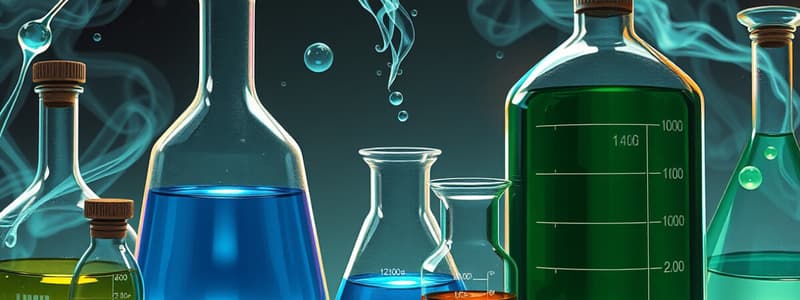Podcast
Questions and Answers
What is the primary use of a beaker?
What is the primary use of a beaker?
- For making precise dilutions
- For holding various chemicals (correct)
- For boiling liquids
- For measuring precise volumes of liquids
A graduated cylinder can estimate the volume of liquid to the nearest 0.1 mL.
A graduated cylinder can estimate the volume of liquid to the nearest 0.1 mL.
True (A)
What is a common use for an Erlenmeyer flask?
What is a common use for an Erlenmeyer flask?
To contain reactions or hold liquid samples.
What is the purpose of a volumetric flask?
What is the purpose of a volumetric flask?
A _____ is used to hold chemicals while experimenting.
A _____ is used to hold chemicals while experimenting.
Burets are used for the addition of a precise volume of liquid.
Burets are used for the addition of a precise volume of liquid.
What additional function do rubber stoppers serve?
What additional function do rubber stoppers serve?
Flashcards are hidden until you start studying
Study Notes
Beakers
- Used for holding various chemicals, not designed for precise measurement.
- Available in different sizes, useful as reaction containers for liquids or solids.
- Essential for catching liquids during titrations and filtering operations.
Graduated Cylinder
- Specifically for measuring liquid volumes, estimated to the nearest 0.1 mL.
- Read measurement at eye level from the meniscus.
- Useful for mixing solutions through swirling.
Erlenmeyer Flask
- Used to contain reactions and hold liquid samples.
- Can be utilized for catching filtrates, benefiting from a narrow neck.
- Suitable for mixing and boiling liquids; comes in various sizes.
Florence Flask
- Used to measure precise volumes of liquid and for making dilutions.
- Ideal for boiling liquids or preparing standard solutions.
- Can collect gases if applicable; varying sizes available.
Volumetric Flask
- Specifically designed to measure exact volumes or to prepare standard solutions.
- Used for precise dilutions; suitable for gas collection.
- Only calibrated for one specific volume, comes in diverse sizes.
Reagent Bottle
- Designed for storing reagents such as acids and bases.
- Useful for transporting chemicals, visibility of contents is key.
Rubber Stoppers
- Used to seal flasks and test tubes, preventing contamination and evaporation.
- Features holes for inserting glass tubing, probes, or thermometers during experiments.
Test Tubes and Rack
- Holds individual chemicals or tubes during experimentation.
- Provides organization and safety during tests or reactions.
Distillation Flask
- Separates liquids based on boiling points, not intended for precise measurements.
Burette
- Allows for the precise addition of liquids, measuring to the nearest 0.01 mL with practice.
- Essential for titration experiments where exact liquid measurements are critical.
Ring Stand and Ring Clamps
- Provides a stable base and structure for experimental setups.
- Holds glassware securely in place during experiments, allowing for safe operations.
Studying That Suits You
Use AI to generate personalized quizzes and flashcards to suit your learning preferences.




